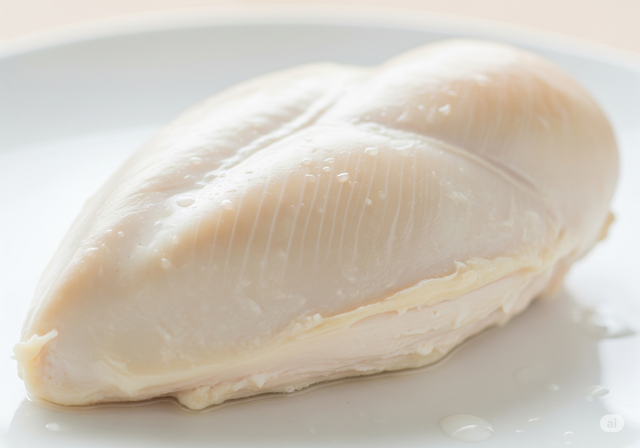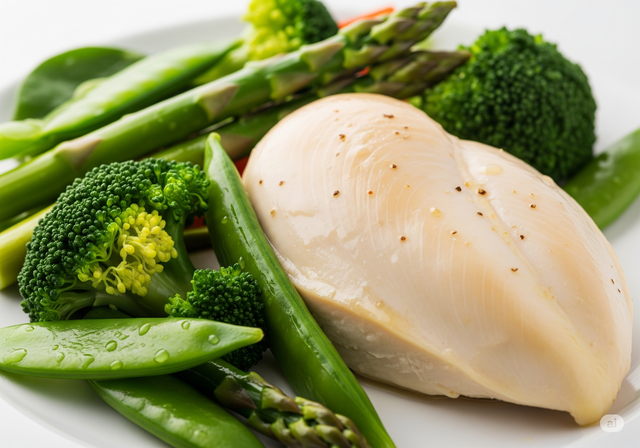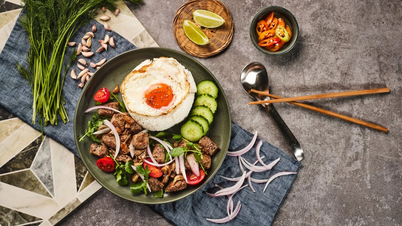Specialist Doctor 1 Nguyen Thu Ha, FPT Long Chau pharmacy system, said that chicken breast is the meat located in front of the chicken's chest, commonly known as lean meat, low in skin, low in fat and rich in protein.
According to data from the US Department of Agriculture (USDA), 100 grams of boiled chicken breast contains about 165 calories, providing 31 grams of protein and 3.6 grams of fat. This is a high-protein, low-fat food, suitable for dieters, gym goers or those who need to control their weight.

100 g of boiled chicken breast contains about 165 calories, providing 31 g of protein and 3.6 g of fat.
Photo: AI
Besides protein, 100 g of boiled chicken breast also provides:
Fat: 3.57 g (mainly unsaturated fat). B vitamins: B6 (0.314 mg), B12 (0.27 mg). Vitamin E: 0.32 mg. Minerals: Calcium (13 mg), iron (0.46 mg), magnesium (25 mg), phosphorus (246 mg).
In particular, boiled chicken breast contains almost no carbohydrates. Thanks to its low fat content and water content of about 65%, this is an ideal food to supplement clean energy without causing fat accumulation, while also supporting effective weight control.
Benefits of eating boiled chicken breast regularly
With high protein content, low fat and rich in essential micronutrients, adding boiled chicken breast to your daily diet not only helps improve your figure but also supports many important physiological functions. Below are the outstanding benefits when you maintain the habit of consuming this food in a reasonable way.
Supports the development and maintenance of lean muscle mass. Boiled chicken breast is a complete source of protein, containing all the essential amino acids that help grow and repair muscle mass. Regular consumption of chicken breast supports lean muscle formation, increases muscle strength and improves training efficiency, especially important for bodybuilders or those who need to recover motor function.
Helps control weight effectively. With only about 165 calories and low fat content per 100g, boiled chicken breast is an ideal choice for people who are losing weight. High protein content also creates a feeling of fullness for a long time, reduces cravings and limits calorie intake, supporting the maintenance or safe loss of body weight.
Improve sleep and enhance memory. Chicken breast contains tryptophan, an amino acid precursor to serotonin, which helps regulate mood and sleep. At the same time, peptides such as anserine and carnosine in chicken help reduce oxidative stress in the nervous system, supporting increased concentration and improved memory in the elderly.
Increases red blood cell production and supports the nervous system. The vitamin B6 and B12 content in chicken breast plays an essential role in the synthesis of red blood cells and protects nerve fibers. People with anemia, nervous disorders or weakness should increase their intake of this group of vitamins through boiled chicken breast.
Good for the heart. Chicken breast is low in fat, especially saturated fat, compared to other meats. This is beneficial for heart health and helps maintain a healthy weight. In addition, chicken breast provides B vitamins (such as niacin, pyridoxine, riboflavin) and minerals (such as phosphorus, selenium, and potassium), which support overall health and physical performance.

Eating chicken breast with green vegetables helps prolong the feeling of fullness, supporting stable energy metabolism.
Photo: AI
How much chicken breast is enough to eat a day?
Dr. Nguyen Thu Ha said that for adults with a balanced diet and not much exercise, the amount of chicken breast they should eat is about 100-120g per day, providing about 22-25g of protein, equivalent to a main meal rich in protein. People who are on a weight loss regimen should also limit this amount, while combining it with green vegetables, good starch and healthy fats.
For bodybuilders, athletes or people who need to increase muscle mass, you can increase to about 150-200g of chicken breast/day, divided evenly into meals. However, you should not overdo it because excess protein can affect liver and kidney function. In addition, you should prepare simple dishes such as boiling, steaming, grilling without oil, avoiding fried foods and reducing salt intake to protect your long-term health.
Note when eating boiled chicken breast to avoid gaining weight
If processed or used incorrectly, boiled chicken breast can still cause unwanted weight gain. Below are important notes to help you take advantage of the nutritional benefits of chicken breast while still controlling your weight well:
Remove chicken skin before cooking : Chicken skin contains high levels of saturated fat and cholesterol, increasing the total energy of the diet. Removing the skin helps reduce calories and supports more effective blood lipid control. Choose fresh chicken breasts that are not mushy and have a light pink color.
Portion Control : Although chicken breast is low in calories, consuming too much without exercise can lead to excess energy.
Prioritize low-calorie cooking methods : Boiling or steaming is a cooking method that retains micronutrients without increasing lipids and hidden calories. Limit pan-frying, deep-frying, or breading to prevent excess fat accumulation.
Combine green vegetables and complex starches : Adding vegetables and slow-absorbing starches such as brown rice, sweet potatoes, and oats helps prolong the feeling of fullness, supports stable energy metabolism, and reduces the risk of uncontrolled snacking.
Limit the use of fatty sauces or sugary condiments : Avoid dipping chicken breasts in mayonnaise, sweet sauces or oils because these increase the energy density of the meal. Prioritize pink salt, black pepper or sugar-free sauces.
Source: https://thanhnien.vn/100-g-uc-ga-luoc-co-bao-nhieu-calo-va-protein-an-the-nao-tot-nhat-185250716170717872.htm































![[Photo] Signing of cooperation between ministries, branches and localities of Vietnam and Senegal](https://vphoto.vietnam.vn/thumb/1200x675/vietnam/resource/IMAGE/2025/7/24/6147c654b0ae4f2793188e982e272651)




































































Comment (0)